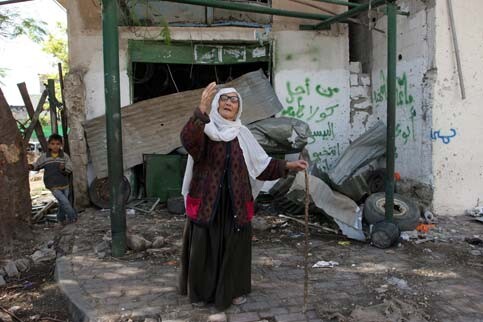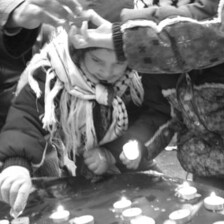Gaza Strip 7 November 2006

An elderly Palestinian woman shouts after an Israeli air strike targeted her house in Beit Hanoun in the northern Gaza Strip, November 7, 2006. (MaanImages/Wesam Saleh)
“The Israeli army soldiers are now blockading the mosque; while a number of resistance fighters are inside, where they have taken sanctuary for fear of being attacked. Dozens of women made their way into the mosque, to make a defensive shield for the helpless men inside,” Faten Sehwail of Beit Hanoun told me by cellphone while huddled inside her home, unable to go outside because of the Israeli army-imposed curfew.
Beit Hanoun is a small Palestinian city in the northern Gaza Strip, where Israeli-created “autumn clouds” are now over the heads of its residents, making their days as black as their nights. Such clouds are poisonous ones, as they have killed, up to the moment of this article, about 50 Palestinian women, men and children and wounded about 200 others.
“Autumn Clouds” is the code name of the Israeli attack currently underway in Beit Hanoun, an offensive that is considered to be the most severe of the past few years. Israel claims that the pretext for the invasion is to “prevent the Palestinian resistance from firing rockets into the nearby Israeli town of Sderot.” Such a pretext has always been the claim for every invasion into Gaza, invasions which have claimed thousands of innocent lives in the last six years of open conflict.
Beit Hanoun has been exposed to several Israeli army attacks since the outbreak of the Palestinian uprising in September 2000, including “Operation Rainbow” in 2004, “Operation Summer Rains” from June to October of this year, currently “Operation Autumn Clouds”, and who knows what euphemistic name will be chosen next?
In 2004, the Israeli army’s “Operation Rainbow” killed more than 120 Palestinian men, women and children, and caused a great deal of destruction to bridges, houses and farms, yet Israel failed to achieve its objective (which was supposedly to ‘stop homemade rocket attacks over the border into Israel’ by punishing the civilian population in the area from which most rockets were fired).
During the Israeli “Operation Summer Rains” since June 27 of this year, 1000 acres of orange and olive orchards have been razed, 18 Palestinian-owned homes have been completely destroyed, and 26 industrial and commercial facilities have been devastated in Beit Hanoun alone, according to the Gaza-based Palestinian Center for Human Rights.
But even having incurred such a high number of losses in Beit Hanoun, the Palestinian resistance never stopped. Even amidst the heavy Israeli army presence, in every single corner of the city, dozens of home-made rockets landed on the nearby Israeli town of Sderot.
“As for the resistance, the amount of impact is not important; the resistance wants to convey a message to the world that there are people with a question, seeking, by all possible means at their disposal, to reach their goal of freedom and establishing their own state — which is a right of all peoples. If you observe the dead and wounded, you find out that children, women and elderly have suffered the lion’s share of the losses”, says Abu Adnan, a senior leader of the Palestinian Popular Resistance Committees.
“The Palestinian people, with their bare chest, are facing a huge, horrible Israeli military arsenal, but at the end of the day, the Palestinian people’s will to attain their freedom forces them to endure such attacks. They will never achieve their freedom if they simply go along with Olmert [the Israeli Prime Minister]’s agenda”, Abu Adnan maintains.
Consecutive Israeli governments have thus far failed to make the Palestinian people in Beit Hanoun succumb to the occupation, despite the fact the army has used all possible means at their disposal to reach that end.
“This government is characterized by its obvious extremism, which now includes Avigdor Lieberman, who has just been given considerable power in the Israeli government. This man has a very extremist position towards the peace process. He also shows a racist stance towards the Palestinians by calling for the transfer of all Palestinians out of Palestine,” says Talal Aukal, a leading Gaza political analyst.
“The other part of the equation is related to the Israeli government’s psychological condition concerning the outcome of its war on Lebanon in June, which has led to a feeling of failure within the Israeli army. So Israel wants to compensate for their failure in Lebanon by soundly crushing the Palestinians in Gaza,” Aukal adds.
Since June 27, the Israeli army has been attacking various parts of the Gaza Strip, including Beit Hanoun, killing approximately 350 Palestinians, wounding thousands, destroying main infrastructure points including power plants (leading to rolling blackouts throughout Gaza since June), bridges, ministerial buildings, farm lands and houses.
At the same time, the poverty rate in Gaza has reached about 70 percent, due to the international aid cutoff after the Hamas-led government took power after elections in January.
Compared with the massive losses the Palestinian people have incurred due to the ongoing Israeli actions across the Gaza Strip, including the latest siege on Beit Hanoun, the Israeli army has lost two soldiers, including one by friendly fire, while the injuries among Sderot’s residents from Palestinian rocket attacks have been slight and few.
Rami Elmeghari is a freelance journalist and translator in the Gaza Strip.
Related Links



